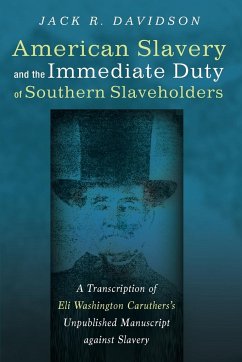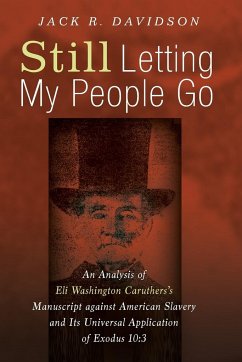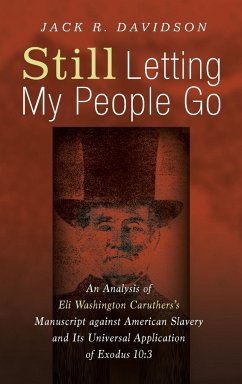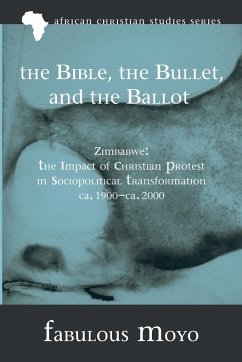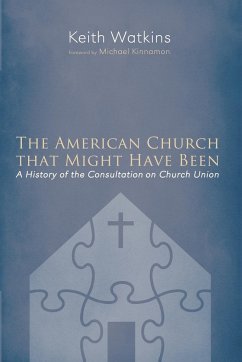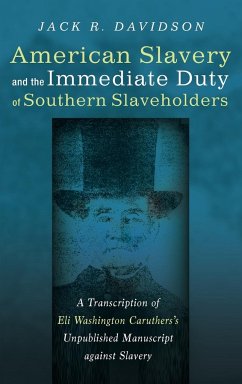
American Slavery and the Immediate Duty of Southern Slaveholders
Versandkostenfrei!
Versandfertig in 1-2 Wochen
34,99 €
inkl. MwSt.
Weitere Ausgaben:

PAYBACK Punkte
17 °P sammeln!
Eli Washington Caruthers's unpublished manuscript, American Slavery and the Immediate Duty of Southern Slaveholders, is the arresting and authentic alternative to the nineteenth-century hermeneutics that supported slavery. On the basis of Exodus 10:3--""Let my people go that they may serve me""--Caruthers argued that God was acting in history against all slavery. Unlike arguments guided largely by the New Testament, Caruthers believed the Exodus text was a privileged passage to which all thinking on slavery must conform. As the most extensive development of the Exodus text within the field of ...
Eli Washington Caruthers's unpublished manuscript, American Slavery and the Immediate Duty of Southern Slaveholders, is the arresting and authentic alternative to the nineteenth-century hermeneutics that supported slavery. On the basis of Exodus 10:3--""Let my people go that they may serve me""--Caruthers argued that God was acting in history against all slavery. Unlike arguments guided largely by the New Testament, Caruthers believed the Exodus text was a privileged passage to which all thinking on slavery must conform. As the most extensive development of the Exodus text within the field of antislavery literature, Caruthers's manuscript is an invaluable primary source. It is especially relevant to historians' current appraisal of the biblical sanction for slavery in nineteenth-century America because it does not correspond to characterizations of antislavery literature as biblically weak. To the contrary, Caruthers's manuscript is a thoroughly reasoned biblical argument unlike any other produced during the nineteenth century against the hermeneutics supporting slavery. ""Jack Davidson's examination of a long-unpublished treatise from 1860 is anything but a historical curiosity . . . The minister, Eli Caruthers, deserves to be much better known for the way he used an Old Testament passage (Exodus 10, 'let my people go') to attack slavery systematically, which was unusual at the time in general and all but unknown in the South. This unusually informative book makes a powerful contribution as both history and theology."" --Mark Noll, author of The Civil War as a Theological Crisis ""Jack Davidson is to be congratulated on transcribing and thus enabling the long overdue publication of Eli Caruther's 1862 manuscript. It reveals the passionately and comprehensively argued anti-slavery stance of this Southern Presbyterian minister's pioneering vision, amazingly based on his reading of Exodus 10:3 . . . This is a must-read for all engaged in understanding the powerful role of the Bible in the anti-slavery debates."" --William S. Campbell, Reader in Biblical Studies ""Eli Carruthers' 1862 writing is a very important antislavery voice from the Confederate South, by a pastor thoroughly familiar with both the Scriptures and the slaveholding society in which he lived . . . It is surprising, almost scandalous, that, though mentioned in scholarly histories, it has remained so long unpublished. By making it available in print, Jack Davidson is doing a valuable service to scholarship and to the reading and thinking public."" --Jack Maddex, Professor of United States History Jack Davidson is the pastor of Alhambra True Light Presbyterian Church in Los Angeles and has previously served churches in Oregon and North Carolina. He has taught courses in Christianity and American Religion at the university level and written numerous papers. He is the author of ""Slavery"" (Oxford Encyclopedia of the Bible and Ethics, 2015).




